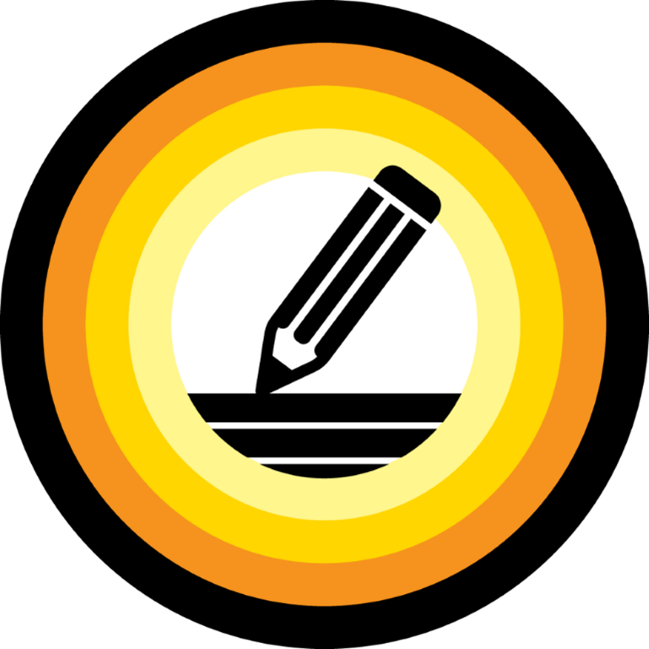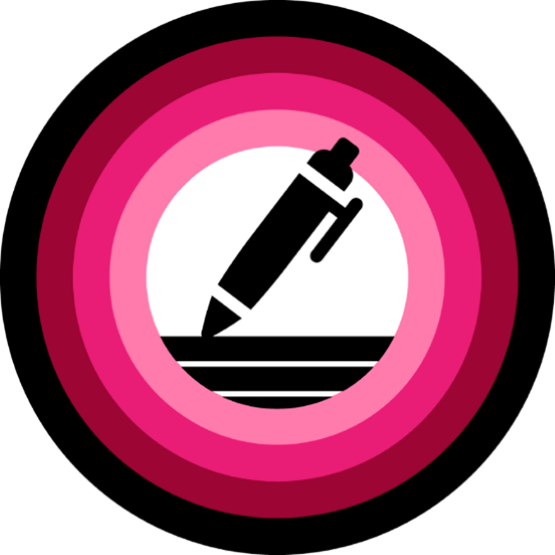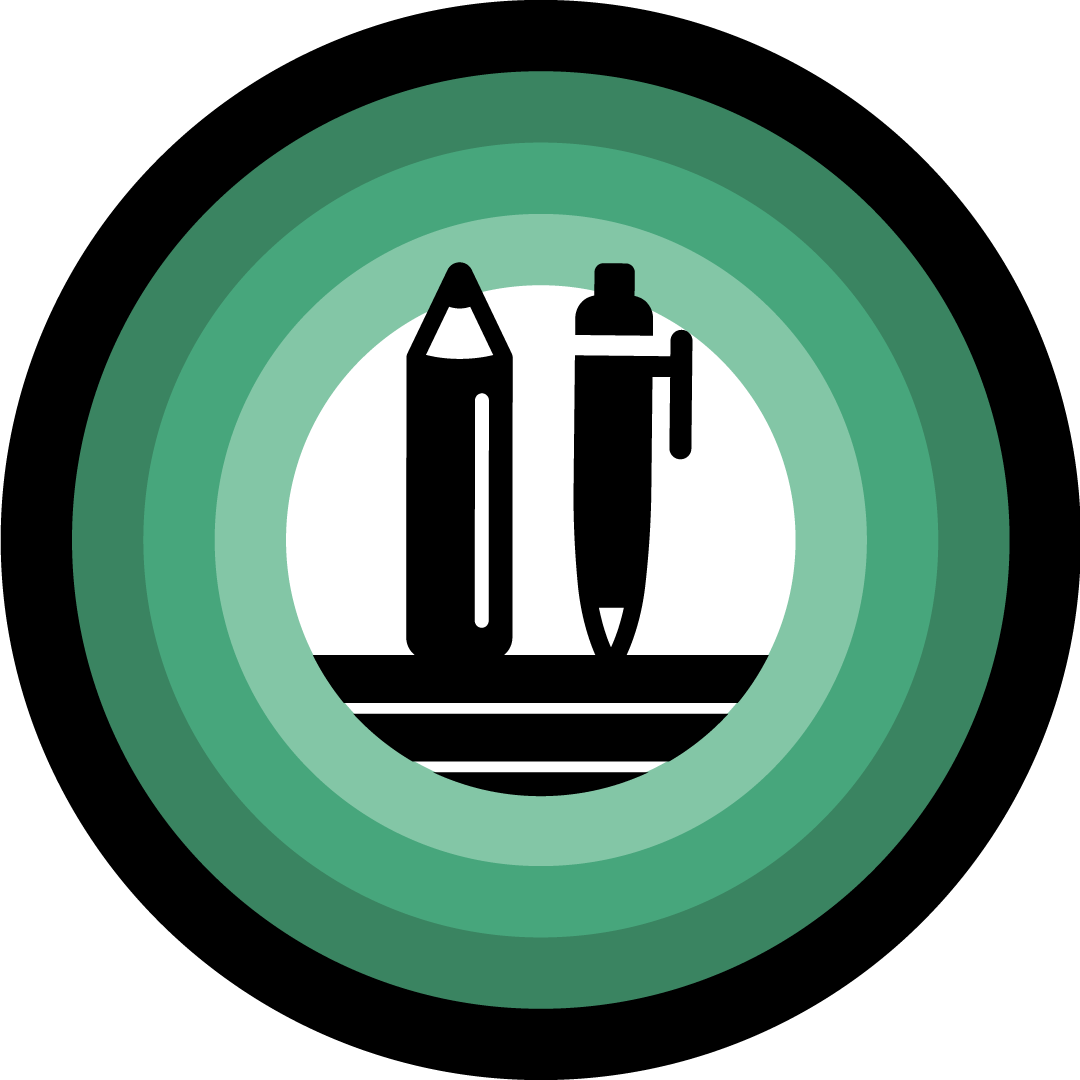Writing Skills Badges
Participate in training with the Student Success Centre and get a badge — or micro-credential — that you can display in your UCalgary Badges profile or social media.
What is a digital badge?
A digital badge is a form of micro-credential that can be used to keep track of the competencies and knowledge you've acquired. They can be used to show your peers or potential employers that you're proficient or certified in a specific skill.
When you've completed a training program at UCalgary, you can collect and share your achievements on your UCalgary Badges profile or social media sites such as LinkedIn.

Time commitment
- 3 hours
Format
- Online/synchronous, OR
- In-person/synchronous
Transferable skills
- Communication
- Academic Integrity
- Self-editing
Foundational Writing Skills
Looking to develop core interdisciplinary writing skills that will help you become a stronger academic writer and self-editor? You can do this by completing the Foundational Writing Skills badge. In this badge program, you’ll explore a variety of writing topics and equip yourself with the skills needed to lead to write effectively in all academic disciplines.
Students who are interested in developing a strong foundation for their writing assignments and students interested in transferable communication, academic integrity, and self-editing skills.
After completing this digital badge, you’ll be able to:
- Describe how to uphold academic integrity in writing assignments.
- Utilize strategies to make your writing experiences more productive and less frustrating.
- Create plans to create effective structure for your written projects.
- Understand core concepts related to effective academic grammar and structure.
Getting started with writing
-
This workshop offers students an introduction to the some of the expectations and challenges that can that affect the writing process. It explores a number of strategies that can help overcome writers’ block and ensure that the process of completing a written assignment is more productive and less frustrating. It features topics like finding sources, and key points to consider when planning to write your paper. This workshop also explores significant concepts to help you improve your writing skills.
Structuring papers and developing effective thesis statements
- Rather than struggle to create a perfect thesis statement on your own, work through this process with us. This workshop offers an overview of essay structure with a particular focus on thesis statements and their role in building arguments.
Writing academically: Ethically incorporating the ideas of others
-
This session provides you with a number of strategies for using sources effectively in your writing. It also focuses on a considerations that are important to consider when you paraphrase an original text, summarize a paragraph, and quote ideas of others. This workshop helps you avoid unintentional plagiarism.
Revising for clarity and concision
- Clarity and concision focuses on how to increase the clarity of your writing and how to become a writer who gets straight to the point. Find out how to increase the clarity of your writing and other tips.
During the workshops, students will have a chance to learn foundational writing skills, discuss topics with others, and learn more about writing supports.
Attendance of Workshops: Students will register for, and attend, three out of four eligible Foundations Series writing workshops within one academic year:
Online quizzes: In addition to attending the workshops, students will be required to complete an online quiz for each workshop and score 80% or higher to demonstrate their learning.

Time commitment
- 3 hours
Format
- Online/synchronous, OR
- In-person/synchronous
Transferable skills
- Communication
- Effective Reading
- Self-editing
Focused Writing Skills
Looking to develop specialized writing skills that will help you to effectively apply your writing skills to a variety of academic contexts? You can do this by completing the Focused Writing skills badge. In this badge program, you’ll explore a variety of genres of academic writing and equip yourself with the skills needed to lead to tailor your work to the specific requirements of particular documents frequently required in academics contexts.
Students interested in developing skills associated with advanced academic writing genres and students interested in developing transferable communication and effective reading skills.
After completing this digital badge, you’ll be able to:
- Describe the forms of associated with particular writing assignments
- Utilize strategies to fit your written work to the forms associated with specific genres
- Understand core concepts related to effective engagement with Academic source material
- Gain skills related to adapting your written work to different audiences
Writing for Rhetoric
- Did you know that there's more to the success of an academic argument than logic? In this workshop, you'll become familiar with the rhetorical “moves” common to most research articles so that you can employ them in your own writing. Using excerpts from research articles in a range of disciplines, we’ll learn how to distinguish clearly between your research problem, the importance of your research problem, and the background to your research problem; how to diplomatically articulate the research gap you intend to fill; how to justify your methodological choices; how to explain any differences between your results and the results of previous researchers; and how to acknowledge your study’s limitations and make suggestions for further research.
Writing the Scholarship Application
- Although not all scholarship applications are equal, there are enough commonalities in purpose, organization, language, and intended audience to consider it a distinct genre of writing. Familiarity with these generic elements are essential if you wish to write a successful application of your own. Using real-world examples of such components of a scholarship application as the statement of intent or purpose, this workshop will focus on organizational strategies and perception management, particularly issues of style and tone, which should reflect the needs and expectations of the intended audience.
Writing the Literature Review
- The literature review is a genre of writing with its own distinctive characteristics, familiarity with which is essential if you are to write a strong literature review of your own. To this end, our writing workshop will focus on the purpose, organization, language, and intended audience of the literature review, using examples from actual University of Calgary dissertations from a range of disciplines.
Writing the Research Proposal
- The research proposal is a genre of writing with its own distinctive characteristics, familiarity with which is essential if you are to write a successful research proposal of your own. To this end, our writing workshop will focus on the purpose, organization, language, and intended audience of the research proposal, using real-world examples from a range of disciplines. In the process, you will learn how to convey the object, importance, and, most importantly, the feasibility of your research project. Please note that this session does not provide information related to preparing proposals for scholarship/funding applications.
During the workshops, students will have a chance to learn specialized writing skills, discuss topics with others, and learn more about writing supports.
Attendance of Workshops: Students will register for, and attend, three out of four eligible Focused Series writing workshops within one academic year:
Online quizzes: In addition to attending the workshops, students will be required to complete an online quiz for each workshop and score 80% or higher to demonstrate their learning.

Time commitment
- 3-4 hours (training)
- 10-12 hours (peer mentorship/facilitation)
Format
- In-person/synchronous
Transferable skills
- Communication
- Leadership
- Facilitation
- Mentorship
Peer Assisted Writing
Looking for an opportunity to build your mentorship skills while strengthening your own abilities as an academic reader and writer? You can accomplish both goals by becoming a Peer Assisted Writing mentor! In this badge program, you’ll explore the benefits of learning with others and equip yourself with the skills needed to mentor peers in inclusive and welcoming active reading sessions.
Students interested in pursuing mentoring opportunities that support student learning and students interested in developing transferable leadership, communication, and facilitation skills.
After completing this digital badge, you’ll be able to:
- Describe how to uphold academic integrity when coaching peers
- Explain the benefits of using writing resources and strategies
- Create a mentorship environment that incorporates inclusive facilitation practices and active reading
- Outline different writing genres and myths associated with the idea of “good” writing
Responding as a reader
Genres and the myth of good writing/using the assignment sheet
Strategies of writing / Introduction in writing resources
Conduct—boundaries
Prerequisite: Foundational Writing Skills Badge
For those students who do not have the Foundational Writing Skills prerequisite, this will be provided in the morning of the Peer Assisted Writing training day.
In-person training: Students will register for, and attend, the training session
During the workshops, students will have a chance to discuss topics with others, practice facilitation skills, and apply learning.
Facilitation of Peer Assisted Writing Sessions: Upon completion of training students will be required to deliver 10 -12 hours of peer support at writing drop down peer assisted writing sessions As an application of learning, students are asked to complete a reflection for each session. Students will receive regular feedback on their sessions from the session facilitator.
